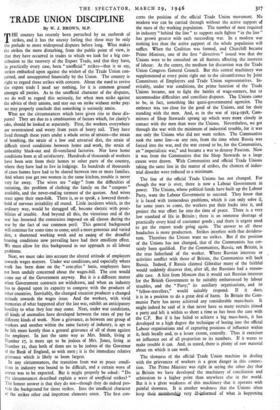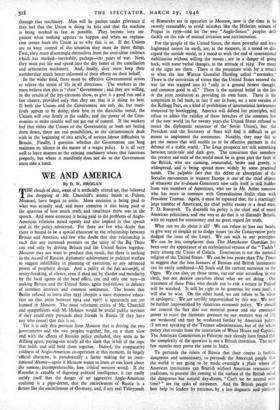TRADE UNION DISCIPLINE
By W. J. BROWN, M.P.
THE country has recently been perturbed by an outbreak of strikes, and it has the uneasy feeling that these may be only the prelude to more widespread disputes before long. What makes the strikes the more disturbing, from the public point of view, is that they have occurred in trades to which we look for a big con- tribution to the recovery of the Export Trade, and that they have, in practically every case, been " unofficial " strikes—that is to say, strikes embarked upon against the wishes of the Trade Union con- cerned, and unsupported financially by the Union. The country is right to regard these strikes with concern. About the need to revive the export trade I need say nothing, for it is common ground' amongst all parties. As to the unofficial character of the disputes, we do well to regard this seriously, for when men strike against the advice of their unions, and stay out on strike without strike pay, we may properly conclude that something is seriously amiss.
What are the circumstances which have given rise to these dis- putes? They are due to a combination of factors which, for clarity's sake, should be looked at separately. First, the workers everywhere are overstrained and weary from years of heavy toil. They have lived through these years under a whole series of strains—the strain of bombing, the strain of a low and unvaried diet, the strain of difficult travel conditions between home and work, the strain of unhealthy black-out and ill-ventilated factories. Nor have home conditions been at all satisfactory. Hundreds of thousands of workers have been sent from their homes to other parts of the country, where they have had to live in lodgings. In hundreds of thousands of cases homes have had to be shared between two or more families. And where you get two women in the same kitchen, trouble is never very far away. The wives are " edgy " from the difficulties of rationing, the problem of clothing the family on the " coupons " available, and the never-ending torment of the queues. And wives react upon their men-folk. There is, so to speak, a lowered thresh- hold of nervous irritability all round. Little incidents which, in the ordinary way, would be shrugged off, become electric with possi- bilities of trouble. And beyond all this, the victorious end of the war has loosened the constraints imposed on all classes during the war by the fact of our common peril. This general background will continue for some time to come, until a more generous and varied diet, a shortened working week and an easing of the dreadful housing conditions now prevailing have had their emollient effect. We must allow for this background in our approach to all labour problems.
Next, we must take into account the altered attitude of employers towards wages matters. Under war conditions, and especially where work has been done on the " cost-plus " basis, employers have not been unduly concerned about the wages-bill. The cost would come out of the Government anyway. But it is a different matter when Government contracts are withdrawn, and when an industry has to depend upon its capacity to compete with the products of other countries. Inevitably, the changed situation produces a changed attitude towards the wages issue. And the workers, with vivid memories of what happened after the last war, exhibit an anticipatory hostility to what they fear may come. Next, under war conditions, all kinds of anomalies have developed between the rates of pay for different kinds of work. Now a grievance, as between one group of workers and another within the same factory of industry, is apt to be felt more keenly than a general grievance of all of them against the employer. In just the same way as Mrs. Smith, living at Number 17, is more apt to be jealous of Mrs. Jones, living at Number 21, than both of them are to be jealous of the Governor of the Bank of England, so with men ; it is the immediate relative grievance which is likely to loom largest.
In any circumstances, the transition from war to peace condi- tions in industry was bound to be difficult, and a certain wave of unrest was to be expected. But it might properly be asked: "Do the circumstances described explain a wave of unofficial strikes? " The honest answer is that they do not—though they do indeed pro- vide the background for those strikes. Into the unofficial character of the strikes other and important elements enter. The first con-
cerns the position of the official Trade Union movement. No modern war can be carried through without the active support of the mass of the working population. The number of men required in industry " behind the line" to support each fighter " in the line " has grown greater with each succeeding war. In a modern war nothing less than the active support of the whole population will suffice. When the Coalition was formed, and Churchill became Prime Minister, one of the first " directives " issued was that the Unions were to be consulted on all Matters affecting the interests of labour. At the centre, the medium for discussion was the Trade Union Congress General Council. But this central machinery was supplemented at every point right out to the circumference by Joint Committees of Employers and Trade Union representatives. In- evitably, under war conditions, the prime function of the Trade Unions became, not to fight the battles of wage-earners, but to accommodate difficulties and conciliate disputes. The Unions came to be, in fact, something like quasi-governmental agencies. The embrace was too close for the good of the Unions, and for their standing with the men. And, as in the war of 1914-1918, Com- mittees of Shop Stewards sprang up which were more closely in contact with the men than were the Unions. Nevertheless, we got through the war with the minimum of industrial trouble, for it was not only the Unions who did not want strikes. The Communists took the same line—at any rate, from the time when Russia was forced into the war, and the war ceased to be, for the Communists, an "imperialistic war," and became a war to destroy Fascism. Now it was from the Communists that the Shop Stewards to a large extent were drawn. With Communists and official Trade Unions taking the same line in the matter of strikes, the chances of indus- trial disorder were reduced to a minimum.
The line of the official Trade Unions has not changed. For though the war is over, there is now a Labour Government in power. The Unions, whose political funds have built up the Labour Party, want the Labour Government to succeed. They know that it is faced with tremendous problems, which it can only solve if, for some years to come, the workers put their backs into it, and project the war effort far into the time of peace. There is a very low standard of life in Britain ; there is an immense shortage of practically every kind of consumer goods ; and there is urgent need to get the export trade going again. The answer to all these headaches is more production. Strikes interfere with that desidera- tum. Therefore the Unions want no strikes. But if the position of the Unions has not changed, that of the Communists has cer- tainly been qualified. For the Communists, Russia, not Britain, is the true fatherland of the worker. Where Russian interests or activities conflict with those of Britain, the Communists will back Russia. Indeed, if Russia claimed Gibraltar many of the faithful would suddenly discover that, after all, the Russians had a reason- able case. A hint from Moscow that it would suit Russian interests for the British Government to be suitably embarrassed by labour troubles, and the " Party," its auxiliary organisations, and its "fellow-travellers," would suitably respond. If it does, it is in a position to do a great deal of harm. In Britain the Com- munist Party has never achieved any considerable mass-basis. It might indeed be said of it that never have so many recruits joined a party and left it within so short a time as has been the case with the C.P. But if it has failed to achieve a big mass-basis, it has developed to a high degree the technique of boring into the official Labour organisations and of capturing positions of influence within it, both locally and, to a lesser extent, centrally. Thus it exercises an influence out of all proportion to its numbers. If it wants to make trouble it can. And, as stated, there is plenty of raw material about on which it can work.
The slowness of the official Trade Union machine in dealing with the grievances of workers is a great danger in this connec- tion. The Prime Minister was right in saying the other day that in Britain we have developed the machinery of conciliation and arbitration to a higher point than anywhere else in the world. But it is a gteat weakness of this machinery that it operates with painful slowness. It is another weakness that the Unions often keep their membership very ill-informed of what is happening
through that machinery. Men will be patient under grievance if they feel that the Union is doing its best and that the machine is being worked as fast as possible. They become very im- patient when nothing appears to happen and when no explana- tion comes from the Union as to why this is so. If the Unions are to keep control of the situation they must do three things. First, they must disentangle themselves from the over-close embrace which has marked—inevitably, perhaps—the years of war. Next, they must put life and speed into the dry bones of the conciliation and arbitration machinery. And, finally, they must keep their membership much better informed of their efforts on their behalf.
In the wider field, there must be effective Governmental action to relieve the strain of life in all directions. The workers in the mass believe that this is " their " Government ; and they are willing, as the results of the bye-elections show, to give it a good run and a fair chance, provided only that they see that it is doing its best. If both the Unions and the Government not only do, but mani- festly appear to be doing, their best in the directions noted, the Unions will stay firmly in the saddle, and the power of the Com- munists to make trouble will not get out of control. If the workers feel that either the Unions or the Government or both are letting them down, there are real possibilities, in the circumstances dealt with in the beginning of this article, of serious labour difficulties in Britain. Finally, I question whether the Government can long maintain its silence in the matter of a wages policy. It is all very well to leave matters to the existing machinery where that functions properly, but where it manifestly does not do so the Government must take a hand.



























 Previous page
Previous page